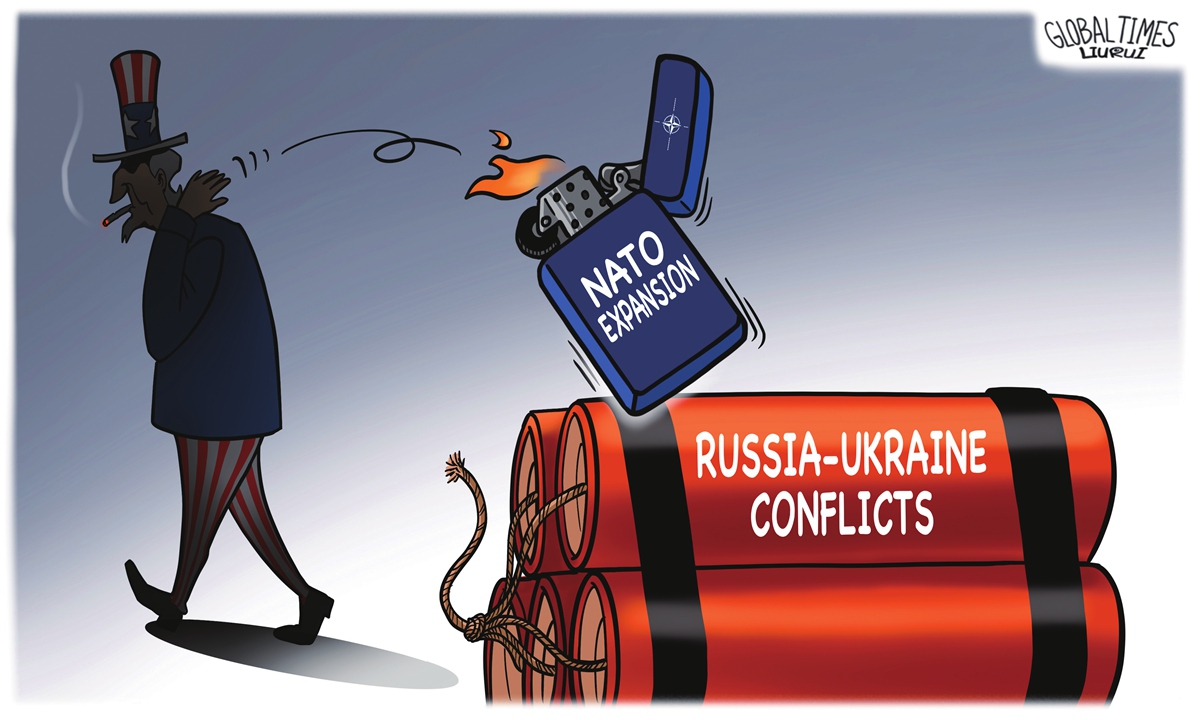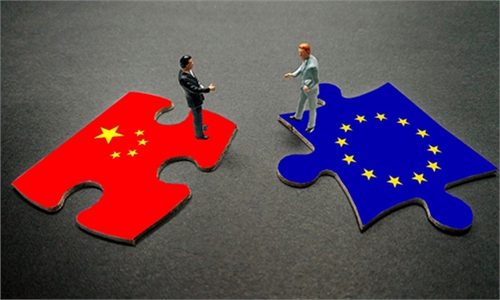
NATO Expansion Illustration: Liu Rui/GT
It has been 31 years since the formal dissolution of the military structures of the Warsaw Pact on March 31, 1991.
NATO, another product of the Cold War era, however, has not dissolved with the end of the Cold War and the disbandment of the Warsaw Pact. NATO's activities have aroused regional and global insecurities. And the ongoing Ukraine crisis was largely triggered by the bloc's eastward expansion.
The continued existence of NATO is mainly to serve the global military hegemony system of the US. Even in the era of the Cold War, the US-led NATO was not only meant to counter the Warsaw Pact, but also served as a tool to dominate the world militarily. This was reinforced after the end of the Cold War. Through military cooperation, Washington can put a grip on many Western countries, especially those in Europe. As a member of the military group, Europe has been heavily impacted by the US in terms of defense policy and strategic decisions. As Washington has regarded Moscow as its foe and rival, it has exploited many European countries to contain and deter it. Today, NATO has become an instrument to maintain US' military hegemony.
NATO has set a target of 2 percent of a member state's GDP to spend on defense. But many countries have failed to meet the target in the past several years, to the annoyance of the US. As a response to the Ukraine crisis, more countries vowed to raise spending to 2 percent. Furthermore, the US took advantage of the Ukraine crisis to sell more weaponry to Europe and ramp up its military deployment against Russia. It can be said that the ongoing Russia-Ukraine crisis has intensified Washington's control over NATO members in Europe.
After the end of the Cold War, in a bid to prove the value and legitimacy of its existence, NATO has created various imaginary enemies and provoked regional conflicts many times, including the Ukraine crisis. Some experts said that the absolute security of NATO is the absolute insecurity of the rest of the world.
With NATO's eastward expansion, the bloc has intensified conflict with Russia and greatly suppressed its strategic space. This has worsened Russia-Europe relations and threatened the peace and stability of Eastern Europe. The pursuit of absolute security has indeed led to regional and global instability.
French President Emmanuel Macron said in 2019 that NATO was experiencing "brain death." On March 17, he told a press conference that he took "full responsibility" for what he said in 2019, but added that "Russia has just provided an electroshock … the awakening" with its military operations in Ukraine.
As a regional power, France hopes that Europe could have a say in its own defense and make its own voice heard and not totally follow the US' lead. It doesn't want war in Europe. But objectively speaking, the Russia-Ukraine crisis does cause European countries to worry about dangerous factors.
However, the Russia-Ukraine conflicts will not last forever. After the two sides achieve a ceasefire, Europe will put more weight and consideration on defense issues and seek to get rid of US control. Even if the US takes advantage of the Russia-Ukraine crisis to strengthen its control over European allies, the continent in future will still adhere to the pursuit of defense autonomy.
Poland, the Baltic countries, are quite militarily dependent on the US, and so NATO is unlikely to disband in the short term. But within the group, cracks and divergences between the US and European members will grow. The EU will have more discourse power and influence in achieving Europe's military autonomy. When Europe faces regional hotspot issues, there will be more independent voices and there will be no need for the existence of gigantic military blocs such as NATO.
NATO is not solidified. There are many inner contradictions within the bloc, such as differences between Turkey and the US as well as the European countries. Turkey and Greece in particular have some historical feud and maritime disputes. All this will bring great uncertainty to NATO.
The author is a Beijing-based military analyst. opinion@globaltimes.com.cn

